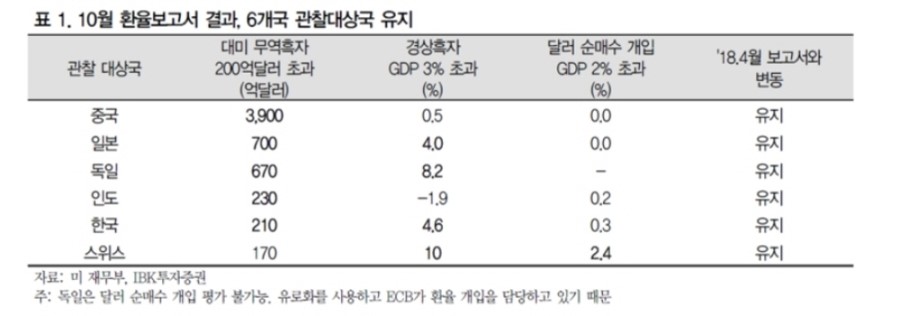한국, 美 재무부의 환율조작국 지정은 모면했지만, 감시대상국으로 남아 【 2018년 10월 19일 금요일자 코리아헤럴드 】
한국, 美재무부의 환율조작국 지정은 면했지만,
감시대상국으로 남아
배현정 기자
목요일, 정부 관계자는 " 한국은 미달러화 환율조작국으로 분류되는 것은 모면했지만, 향후 6개월간, 감시대상국 명단에 오를 것이다." 라고 밝혔다. 이와관련, 한 기획재정부 관계자는 " 한국이 환율조작국(Currency Manipulating Country)으로 지정되지는 않았기 때문에 외환시장은 큰 충격을 받지 않을 것이다. 하지만, 중국이(내년 4월까지 )환율조작국으로 지정될 것이기 때문에, 이로인한 상당한 간접적 영향이 한국의 실물경제에 미칠 것이다." 라고 했다.

이번 기재부의 논평은 주요 6개 무역대상국들을 감시대상국 명단에 올린 美 재무부의 반기환율정책보고서 공개의 파장이 일파만파 커지는 와중에 나왔다. 한국 ·중국 ·독일 ·인도 ·일본 그리고 스위스가 환율관찰대상국에 올랐지만, 환율조작국으로 지정된 나라는 없었다.
성명서에서 , 스티븐 므누신 (Steven Mnuchin : 1962년 12월 21일 ~ ) 美 재무장관은 " 美 재무부는 우리의 무역대상국들이 자유롭고 · 공정한 상호무역에 걸림돌이 되는 불공정한 무역장벽을 허물도록 하기 위해 적극적으로 협력하고 있다." 고 했다. 특히, 미 의회에서는 중국의 환율투명성 부족과 최근 통화약세를 지적하고 나섰다. 미국정부가 특정국가를 환율조작국(Currency Manipulating Country)으로 지정하기 위해서는 200억달러 이상의 무역흑자 혹은 적어도 국내총생산( GDP: Gross Domestic Product)의 3퍼센트 에 상당하는 경상수지 흑자 뿐만 아니라 외환거래상에 있어서 일방적인 시장 개입이 지속적으로 있어야 한다.
한편, 이전까지 우리정부는 앞서 미국정부가 정한 환율조작국 지정요건들 중 2가지에 해당되었으나, 외환시장의 단계적 추세에 대한 정부개입관련 기록을 공개하여 외환시장의 투명성을 개선하기 위한 조치를 취해나가는 한편, 이를 1년단위로 공개할 예정이다. 美 재무부는 한국의 대미 무역흑자가 지난해 7월부터 올해 6월까지 210억 달러이며, 경상수지 흑자는 같은 기간 국내총생산(GDP) 대비 4.6% 수준이라고 밝혔다1. 이에 대해, 우리금융당국은 일관되게 통화시장 개입의혹을 부인하며, 환율시장의 급격한 움직임에 대해 미세조정 ( 스무딩 오퍼레이션 : Smoothing Operation / 환율 안정화조치 )을 했다고 주장했다.
한편, 김동연 부총리 겸 기획재정부장관은( 1957.01.28~ ), 지난 주, 발리에서 개최된 G20 재무장관회의 와는 별도로 열린 한-미 재무장관회담에서 이 같은 사실을 므누신 재무장관에게 거듭 강조해 말했다.
美 재무부 보고서는 " 美재무부는 한국의 금융당국이 최근 환율개입의 투명성을 높이기 위해 발표한 계획들을 비롯한 한국의 통화시장관행들을 예의주시할 것 " 이라고 밝혔다.
S. Korea avoids being labeled currency manipulator, remains on watch list
▲US Secretary of the Treasury Steven Mnuchin attends a Financial Stability Oversight Council meeting, Tuesday. (Yonhap-AFP)
화요일, 금융안정성감독위원회에 출석한 스티븐 므누신 (Steven Mnuchin : 1962년 12월 21일 ~ ) 미 재무장관(연합/AFP통신)
South Korea has avoided being classified as a currency manipulator by the United States, but will remain on its monitoring list over the next six months, financial officials said Thursday.
“The foreign exchange market here will not receive much impact as we were not designated as a currency manipulating country,” said an official of the Ministry of Economy and Finance.
“But should China be named a currency manipulator (in April next year), there will then be significant indirect impact on Korea’s real economy.”
The comment came in the wake of the US Department of the Treasury’s semiannual foreign exchange policy report, released Wednesday, which put six major trading partners on the monitoring list.
The six countries on the list are South Korea, China, Germany, India, Japan and Switzerland. None were named currency manipulators.
“The Treasury Department is working vigorously to ensure that our trading partners dismantle unfair barriers that stand in the way of free, fair and reciprocal trade,” Treasury Secretary Steven Mnuchin said in a statement.
The US policymaker especially pointed out to China’s lack of currency transparency and the recent weakness of its currency.
In order to be designated as a currency manipulator by the US government, a country should record a bilateral trade surplus of $20 billion or more and a current account surplus of at least 3 percent of its gross domestic product, as well as “persistent, one-sided intervention” in foreign currency interactions.
While Seoul meets the former two requirements, it has been making gestures to improve the transparency of its foreign exchange market by revealing the records on government intervention in an incremental pace, starting yearly next year.
The country’s goods trade surplus stood at $21 billion over the four-quarter reporting ending in June, which was down $7 billion and its current account surplus was 4.6 percent of the GDP.
Korea’s financial authorities have consistently denied their interference in the currency market and claimed to have carried out some “smoothing operations” against extreme movements.
Deputy Prime Minister and Finance Minister Kim Dong-yeon also reiterated the message during a bilateral meeting with his US counterpart, held on the sidelines of the Group of 20 Financial Ministers’ Summit held in Bali last week.
“The Treasury will continue to monitor closely Korea’s currency practices, including the authorities’ recently announced plans to increase the transparency of exchange rate intervention,” the US report said.
By Bae Hyun-jung(tellme@heraldcorp.com)
